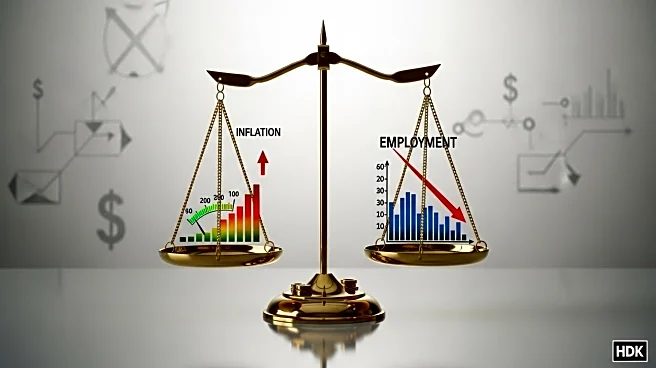What's Happening?
Jerome H. Powell, Chairman of the Federal Reserve, addressed the complexities of managing inflation and employment during his remarks at the Adam Smith Award lecture in Philadelphia. Powell emphasized that there is no 'risk-free' path for policy as the Federal Reserve navigates the tension between its employment and inflation goals. Despite the government shutdown causing gaps in federal data, Powell stated that the outlook for employment and inflation has not significantly changed since the September meeting. He noted that the economy might be on a firmer trajectory than expected, although the labor market shows signs of cooling. Powell highlighted that the Federal Open Market Committee will continue to follow its meeting schedule, making decisions based on available data, including alternative sources like state-level unemployment claims and private-sector reports.
Why It's Important?
Powell's remarks underscore the Federal Reserve's ongoing challenge in balancing its dual mandate of stable prices and maximum employment. The potential rate cut decision is significant as it could impact borrowing costs, consumer spending, and overall economic growth. The government shutdown complicates this decision-making process by limiting access to key federal data, forcing reliance on alternative data sources. This situation highlights the delicate balance the Fed must maintain to avoid either leaving inflation unchecked or causing unnecessary losses in the employment market. The broader implications affect U.S. industries, businesses, and consumers, as interest rate changes can influence economic activity and financial stability.
What's Next?
The Federal Open Market Committee is scheduled to meet on October 28 and 29, where it will consider the available data to make decisions regarding interest rates. The Bureau of Labor Statistics is set to publish September's consumer inflation report on October 24, which will be reviewed by FOMC members before their meeting. The Fed will continue to assess the impact of tariffs on inflation and economic growth, as these factors pose additional challenges in achieving its policy goals. Stakeholders, including businesses and policymakers, will be closely monitoring these developments to gauge potential economic outcomes.
Beyond the Headlines
The reliance on alternative data sources during the government shutdown raises questions about the robustness and reliability of economic indicators used by the Federal Reserve. This situation may prompt discussions on the need for contingency plans or improved data collection methods during such disruptions. Additionally, the interplay between tariffs and inflation could lead to broader debates on trade policy and its impact on domestic economic stability.










